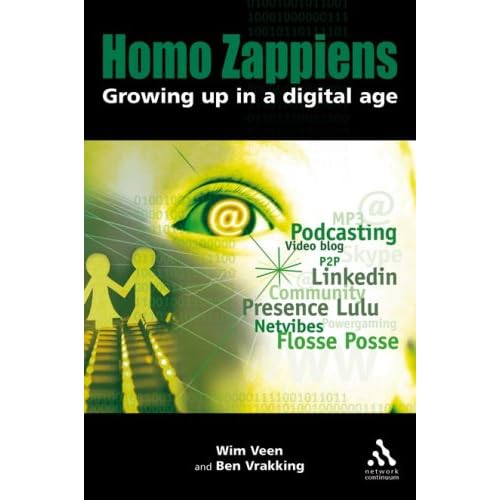
Last week I had an interview with Professor Wim Veen. He is the author of the well recieved (read the review by Jay Cross on Amazon.com) book "Homo Zappiens, Growing Up in a Digital Age" about the positive aspects of short attention span fever, disdain for school, and independence, showing an optimistic take on kids and technology today.
Professor Veen is a member of the Delft OCW project group and is responsible for creating a vision about how the future of Delft OCW should look like to be sustainable. I discussed this with him in an extensive interview, following the line of thought on sustainability by David Wiley. You can find the interview report on my wiki.
Some interesting notes;"The value of the Open Educational Resources site is not determined by the content that is placed on it, but by the community that is engaged in it."
" The lab environment can be described as an online environment that is social and has a wiki spirit: anyone can use, contribute, and discuss resources, and people can easily form networks or communities. Communities are fostered on this site, and it is attractive for its users not only because of high quality content, but of the opportunity to connect with others."
"The ultimate objective of OCW is that DUT will become a hub in knowledge networks."
"Specific goals of the lab environment is that next to content, we will facilitate processes that empower students, anywhere, to (i) add content, (ii) communicate about content (with or without “disturbing” the teacher), and (iii) collaborate on creating new TU-approved content. Ultimately, the course of a teacher will become a hub in a knowledge network. Students should be able to enhance or improve the network. We need something like a labeling system that defines the TU approved content, which would not only be content that is made within the university, but approved."
"In specific, the trend of 2D to 3D will continue, and will have a valuable place in learning. This should be monitored very well, until a 3D standard will come, and do something with it."
"The largest social capital on the university are our own students. I would like to see students enriching and improving the lab environment itself. This means that teachers should stimulate them as well in doing this. Not just consuming behavior, but actively participating in the improvement of the environment. Courses that show a lot of activity will appeal to other teachers, who will desire the same level of activity. What is needed for this?
"Branding is crucial. Take Berkley's initiative to put their courses online on !YouTube... they are not so wel received. Old-fashioned teaching in large classrooms, video materials of low quality: their brand can actually hurt instead of improved by these videos. The university should also be aware that by putting static PDF documents rather than high quality interactive and flexible content online, the brand value might not be increased, but hurt. Following the same line of argument, the university's brand may increase very much if the content is of high quality. As mentioned, a course format and accompanying support per faculty is needed for this. A strong focus must be on the visualization of the content: human-computer interaction."
Oct 23, 2007
Interview Wim Veen: Future of Delft OCW
Labels: education, new learning paradigms, open education
Subscribe to:
Post Comments (Atom)


No comments:
Post a Comment